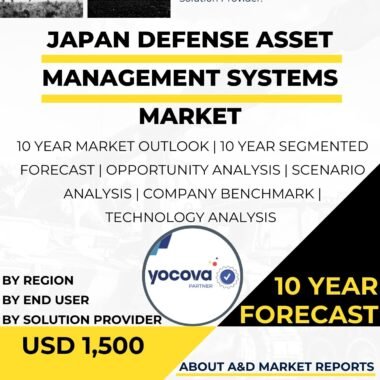Description
Brazil’s Defense Asset Management: Optimizing Readiness
The Brazil Defense Asset Management Systems market is a crucial and rapidly evolving sector. It plays a significant role in boosting the country’s defense capabilities. Defense organizations use these systems to track, monitor, and optimize assets. These assets include military equipment, vehicles, weapons, and other resources. Consequently, these systems help defense forces maintain operational readiness. They also reduce downtime, improve maintenance, and enhance resource allocation. Brazil seeks to modernize its armed forces and ensure strategic readiness, so demand for advanced asset management systems continues to rise.
Key Role in Logistics and Supply Chain
Asset management systems profoundly impact logistics and supply chain management. Brazil’s defense industry includes diverse military equipment. This equipment features aircraft, naval vessels, armored vehicles, and infantry weapons. Efficient logistics are vital. They ensure the timely delivery of equipment, spare parts, and fuel where needed. Asset management systems provide real-time visibility. This includes inventory levels, maintenance status, and deployment schedules. Therefore, defense forces can optimize logistics and reduce response times in critical situations.
Maintenance and Efficiency Optimization
Asset management systems also play a pivotal role in optimizing maintenance and support. Brazil’s diverse defense platforms require robust maintenance schedules. This ensures operational readiness and longevity. The systems use predictive analytics and condition monitoring. In particular, they identify potential issues and schedule maintenance proactively. By adopting preventive maintenance strategies, defense forces reduce equipment downtime. They furthermore extend asset lifespans and minimize repair costs.
Market Players and Government Support
A mix of domestic and international players characterizes the Brazil Defense Asset Management Systems market. They offer diverse solutions to meet defense organizations’ specific requirements. Local companies, such as AEL Sistemas and IACIT, actively develop and deploy indigenous systems. Indeed, this contributes significantly to Brazil’s defense industrial capabilities. Collaborations with global defense technology providers also facilitate technology transfer. These partnerships help adopt cutting-edge solutions for the country’s defense operations.
To stimulate growth, the government proactively supports research and development (R&D) initiatives. It provides funding for projects that enhance domestic system capabilities. Investments in human resources and technology transfer agreements similarly nurture domestic expertise in asset management technologies.
Broader Adoption and Financial Benefits
The market extends beyond traditional defense applications. Civilian agencies likewise utilize asset management systems. This includes law enforcement, emergency services, and public safety organizations. They use the systems to optimize resource deployment and maintenance. In disaster response or public events, efficient asset management is critical. Above all, it ensures a rapid, coordinated response that saves lives and protects public safety.
Furthermore, adopting these systems contributes to overall cost savings and resource optimization within the defense industry. Defense forces track asset usage and maintenance needs accurately. Thus, they can avoid unnecessary equipment redundancies. This reduces overall lifecycle costs. In essence, this cost-effectiveness allows for more strategic allocation of the defense budget, thereby enhancing national security and preparedness.
Challenges and Future Focus
Brazil seeks to enhance its defense industry’s technological capabilities. Therefore, R&D efforts are crucial for advancing indigenous asset management systems. Collaborations between the government, defense agencies, research institutions, and private companies foster innovation. This knowledge exchange drives progress. This commitment builds Brazil’s strategic autonomy and self-reliance in system implementation.
However, the market faces certain challenges that require attention. One key challenge involves the integration and interoperability of various systems. Different defense branches and units use these systems. In this context, ensuring seamless data exchange and compatibility is essential. This creates a unified, comprehensive asset management approach.
Moreover, cybersecurity is a critical aspect. These systems handle sensitive data about defense assets and operations. Consequently, robust cybersecurity measures and data protection protocols are necessary. They safeguard critical information and prevent unauthorized access or system tampering.
Conclusion
The Brazil Defense Asset Management Systems market is a vital sector. It strongly contributes to the country’s modernization and preparedness. Asset management systems optimize logistics, maintenance, and resource allocation. They ensure the operational readiness of defense forces and enhance cost-effectiveness. Ultimately, through strategic partnerships, R&D, and global collaborations, Brazil can boost its indigenous capabilities. Addressing challenges like interoperability and cybersecurity will be crucial. This unlocks the market’s full potential and ensures the efficiency of defense operations.




